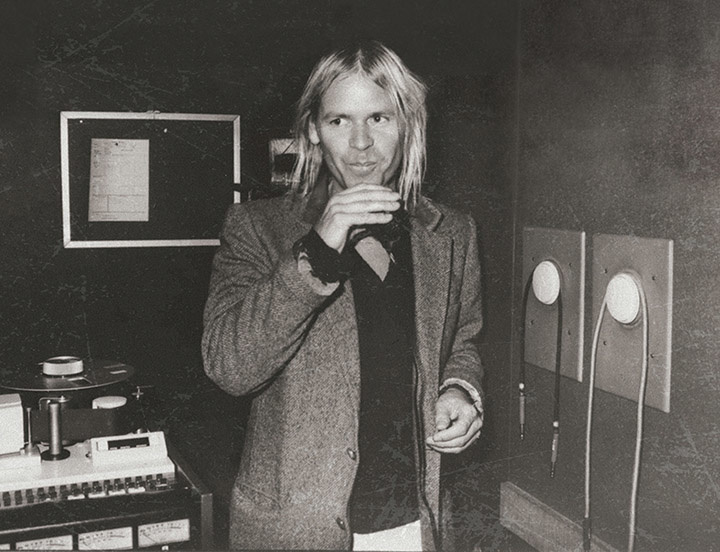
One of the biggest misconceptions some people have about Van Halen’s early history is that they believe the band’s original producer, Ted Templeman, wanted to replace singer David Lee Roth with Sammy Hagar before recording their first album.
This isn’t true. Or, at least, it wasn’t true for more than a moment of time.
To set the record straight, here’s a short excerpt from the new autobiography, Ted Templeman: A Platinum Producers Life in Music:
“Van Halen’s biggest issue was one that as a producer I feared I couldn’t fix. The truth was that Dave’s performance in Sunset Sound [while recording the band’s original 25-song demo in 1977] only raised my anxieties about his abilities. Some of his vocal performances, to be frank, just weren’t acceptable. To be sure, he was distinctive as a singer; his train-whistle screams were identifiable in a good way. But every time I heard him get pitchy or completely miss a note, I worried that the public was going to be turned off by this band because of his limitations.
“Donn [Landee, Van Halen’s original engineer] picked up on the same things. Since I’d confided in him my thoughts on Sammy Hagar, he’d turn to me when we were both at the board and whisper, “You’ve gotta call Sam.” I’d nod and say under my breath, “You’re right.” [Ted knew Sammy Hagar as a strong vocalist from producing the first Montrose album — an album Van Halen loved]. He knew that Dave scared the shit out of me. Thinking back on that first go-around with Dave in the studio, I started wondering if I should stop talking about it and actually see about firing him. While he had his moments, he mostly just croaked along while the other guys played the most amazing shit. At first, Van Halen was like a really terrible algebraic formula that you need to solve but don’t know how to. On the plus side, I had a great band with an incredible guitar player and a singer who did these screams that were different than anything I’d ever heard. I still don’t know how he did them. He also had this engaging personality and looked great onstage. But the fact remained that he really couldn’t sing well. Could I find a way to pull better performances out of him? I honestly didn’t know.
“As I mulled things over, I tried to attend as many Van Halen rehearsals as possible. They practiced in the basement of Dave’s father’s house in Pasadena. I listened to their new songs and gave them feedback. They had a great big blackboard, like you’d have in a classroom, and we’d write these ideas down. At these rehearsals Dave would show me his lyrical ideas, things that became classics like “Atomic Punk” and “Ain’t Talkin’ ’Bout Love.” When we took breaks I’d talk at length with him. That’s when I came to appreciate his astounding intellect; he’d quote a line from Tom Sawyer and then a comic book. I still don’t know anybody who can keep those kinds of stream-of-consciousness raps going like he can. Captain Beefheart used to try to do that; all the guys around Frank Zappa thought they could do that. But Dave naturally is that way. His intelligence came through in his writing, too. The more I read his lyrics, especially “Ain’t Talkin’ ’Bout Love,” the more impressed I became. His line in that song about bleeding for something you really desire just stuck with me. He was extremely well-read and smart, and that showed up in his whole approach to fronting Van Halen. He also had a tremendous sense of humor and dead-on comic timing. I thought that aspect of his personality, in particular, made for something unique within the heavy metal realm. Most bands of that genre were so strident and serious to the point of cliché. Dave had a unique way of laughing through the daily events of life that was infectious.
“So for me solving the puzzle of how to make Roth work within the confines of Van Halen came down to this: He wasn’t a conventional singer, to be sure. But he had certain gifts that were rare in the rock world, and those assets outweighed his flaws. In the end, I hung in there with Dave, thinking that I’d find a way in the studio to accentuate his strengths and minimize his weaknesses. That’s why I decided against calling Sammy. I love Sammy as a person and as a singer, but if I’d tried to put him in Van Halen in 1977, I’d have made the biggest mistake in rock history, because Van Halen never would have made it without Dave fronting the band.”


VH fans should be sure to grab Ted Templeman: A Platinum Producers Life in Music, by Greg Renoff (author of Van Halen Rising). — Ted Templeman contains a great deal of never-heard-before Van Halen stories, straight from the producer of their first six albums! Grab your copy at Van Halen Store.